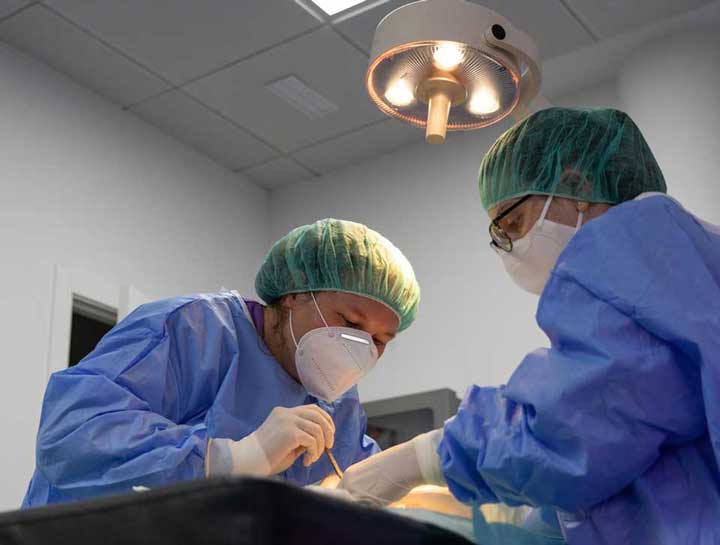Surgical Info
Preparing Your Pet For Surgery
Before surgery, your pet will undergo a pre-operative examination and blood work to ensure they are healthy enough for the procedure. NPO guidelines will also be provided to help prepare them for anesthesia, along with a medication regimen tailored specifically to their needs.
Pre-operative Examination And Blood Work
At our veterinary clinic, we prioritize the safety and well-being of your pet before any surgical procedure.
Blood work is an essential part of pre-operative screening as it helps detect potential underlying health issues, such as liver or kidney disease, that may be missed during a physical exam alone.
It also provides our vets with baseline values to monitor your pet’s recovery after surgery.
NPO Guidelines
Before your furry friend undergoes a surgical procedure, it’s crucial to follow the “nothing by mouth” or NPO guidelines. This means that for a certain period before surgery, your pet cannot eat or drink anything.
Your veterinarian will provide specific instructions on when to start following these guidelines based on their individual needs and the type of surgery they are having. Following the NPO guidelines strictly is vital because not doing so could lead to complications during surgery.
Medication Regimen
Your pet’s medication regimen is an essential part of preparing them for surgery. Our veterinarians will provide specific instructions on when and how to give medications, including antibiotics and pain management drugs.
At Spicewood Vet Clinic, we understand that administering medications can be stressful for both pets and their owners. That’s why our experienced staff will take the time to demonstrate proper administration techniques and answer any questions you may have about your pet’s prescriptions.
We also offer a range of affordable pricing options, so you can feel confident in giving your pet the care they need without breaking the bank.
Anesthesia And Monitoring
During surgery, your pet will receive anesthesia to ensure they are comfortable and pain-free throughout the procedure. At Spicewood Vet Clinic, we take every precaution to make sure your pet is safe while under anesthesia.
During surgery, our experienced veterinarians closely monitor your pet’s vital signs, including their heart rate, respiratory rate, blood pressure, and oxygen levels using state-of-the-art monitoring equipment.
This ensures early detection of any potential problem, allowing us to intervene quickly if needed.
Post-Surgery Care For Your Pet
Proper post-surgery care is just as important as the actual surgery itself. Our team at Spicewood Vet Clinic provides comprehensive pain management, medication instructions and wound care for your furry friend’s speedy recovery.
Pain Management
After pet surgery, pain management is a crucial part of your furry friend’s recovery process. At Spicewood Vet Clinic, we understand that every animal is different and each may require varying levels of pain relief.
We offer several options to ensure that your pet feels as comfortable as possible during their healing period.
Our veterinarians will assess your pet’s pain level and recommend the best medication and dosage for them. We provide both oral and injectable medications to control their discomfort.
In addition to medical intervention, we also suggest giving plenty of love, attention, and appropriate rest time to aid in the healing process.
Activity Restriction And Exercise Guidelines
After your pet’s surgery, it’s crucial to follow the activity restriction and exercise guidelines advised by our veterinarians at Spicewood Vet Clinic. This is to ensure proper healing and prevent any complications or setbacks.
For example, if your pet undergoes orthopedic surgery, you may need to restrict their movement for several weeks while their bones heal. On the other hand, if they have undergone soft tissue surgery like an abdominal operation, they may only require short walks on a leash during recovery.
Remember that ignoring these guidelines could potentially lead to further health problems down the line for your beloved furry friend.
Medication Instructions
After your pet undergoes surgery, our veterinarians will provide you with detailed instructions on the medication required for their recovery. It’s crucial to follow these instructions correctly to ensure a smooth and safe healing process for your furry friend.
Our team will educate you on the proper dosage and frequency of administration to avoid any underdosing or overdosing.
We highly recommend keeping a record of when each dose is given to ensure no missed doses or complications resulting from incorrect timing or dosage errors.
Wound Care And Bandaging
After pet surgery, your furry friend will need proper wound care and bandaging to ensure a smooth recovery.
Proper wound care involves keeping the incision area clean and dry at all times. Your veterinarian may recommend an E-collar or other measures to prevent your pet from licking or biting at the incision area.
Bandages may be necessary to protect the wound and keep it secure, especially if your pet is prone to licking or scratching.
Trust us with your pet’s aftercare needs and give them the best chance for a speedy recovery.
If you’re ready to schedule a consultation or surgery appointment for your furry friend, Spicewood Vet Clinic makes it easy! You can give us a call at (512) 825-4099 during our business hours from Monday through Friday. Alternatively, you can fill out our online contact form on our website, and we’ll get back to you as soon as possible. Our staff is always happy to answer any questions or concerns you may have about the surgical process, costs of services, or anything else related to caring for your pet’s health.

